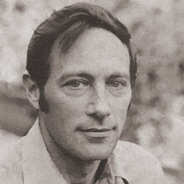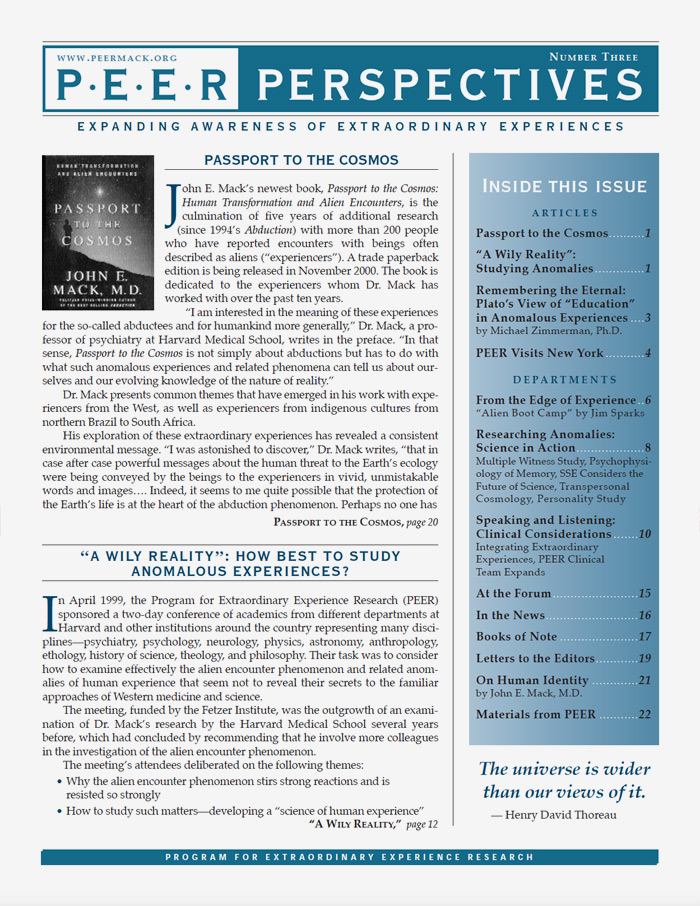This project has been completed
When we created the Program for Extraordinary Experience Research (PEER) in 1993, we gave careful thought to the selection of our name and articulation of our purpose. “Extraordinary experiences”, as some have wondered, was not merely a euphemism for “alien encounter experiences.” We envisioned PEER as a place for supportive exploration, neutral listening, and open inquiry for people having experiences that challenge our notions of reality and the world in which we live. Our intention was to find language to describe what may not yet be known and hold that challenging place of not knowing as an evolving process of self-inquiry.
PEER has grown into its name and its purpose, both scientifically and philosophically. Through our own research and through partnerships with colleagues in many diverse fields, we have expanded the context of the extraordinary experiences that we explore, while maintaining our primary focus on the alien encounter experience.
The nature of aliens (whether or not they are “real”) is secondary to PEER’s primary interest in how alien encounters affect people’s lives and their personal, societal and global worldviews.
“What do people really want when they think about UFOs? According to John Mack, the first thing they want is for their experiences to stop. Only after they realize they have no power to stop the experience do they begin to to accept a process that is informative and transformative – a process that propels them out of their narcissistic concerns and towards active involvement with environmental values, the survival of humanity and an exploration of spiritually-based consciousness. Perhaps Wilber, the philosopher…might discover he has more in common with Mack than he realizes.”
— The Vancouver Sun
The emergent themes documented in interviews conducted by Dr John Mack and colleagues with “experiencers” from around the country and other parts of the world, and affirmed by more than ten thousand letters from the public, reveal an experience that touches people deeply, affecting their outlook on spiritual, environmental, and social aspects of life.
Therefore a central theme in our educational efforts is to convey that opportunities for personal and societal growth can result from life experiences which challenge our worldviews.
We engage the philosophical question of how worldviews evolve as knowledge expands, and how cultures adapt in the face of new information.
We enter this discussion with an unparalleled body of clinical knowledge detailing the traumatic and transformational elements of this process (gathered from our clinical sessions with over 200 experiencers who have undergone this transformation in their own lives), which we can expect to see occur in the culture at large as new worldviews vie replace old ones.
Current Status of PEER
[As of 2002] the Program for Extraordinary Research (PEER) is no longer an active research project, however the knowledge amassed over the course of its existence continues to inform our efforts; elements of PEER’s work may be found within many of our initiatives.
The decision to formally conclude the PEER project was due in part to our belief that through our explorations we have reached an informed understanding of the phenomenon of alien encounters – or, to be more precise, we believe we reached as informed an understanding as our culture may presently be capable of appreciating.
We feel that if we are to make significant new discoveries about the nature of the reported alien contact, we must first learn more about human contact – our connections to one another and to the world. Our efforts in this area have therefore shifted to promoting expanded awareness of human experience on the part of the greater culture, so that understanding of alien encounters (and other extraordinary experiences) and the context within which they occur may continue to be refined. We also remain dedicated to advancing responsible inquiry into this subject; we continue to discuss what we know of this phenomenon when appropriate.
History of PEER
The Program for Extraordinary Experience Research (PEER) was founded in 1993 by Harvard professor of psychiatry and Pulitzer Prize-winning author John E. Mack, M.D.
Dr. Mack’s earlier studies in transpersonal psychology laid the groundwork for him to consider the merits of an expanded notion of reality, one which allows for experiences that do not fit the Western materialist paradigm.
Among the most complex experiences in contemporary society that seem to defy this paradigm are so-called “alien encounters,” because they involve the perception of beings or intelligences that interact with people in ways which seem physical, yet do not leave behind any physical record of their presence that can later be validated by the tools of material science.
Intruiged by the apparent cross-over of these seemingly “mystical” experiences into the physical realm, Dr. Mack devoted twelve years to clinical investigation of more than 200 individuals who reported repeated experiences. The portrait that emerged shows narrative consistency, a close association with UFO sightings, and experiences that are shared by two or more people, for which no convincing clinical explanation exists.
In his two books on the subject of alien encounters, Abduction: Human Encounters with Aliens (1994) and Passport to the Cosmos: Human Transformation and Alien Encounters (1999), Dr. Mack suggests that our culture has much to learn from these and other extraordinary experiences that shape our lives, regardless of their ontological status. Dr. Mack in essence asks for an expanded definition of reality, one that does not discount or dismiss experiences that fall outside our present framework of understanding.
This suggestion met with a spectrum of response. In addition to widespread support, the suggestion also encountered vocal opposition. PEER’s exploration of the “human dimension” of extraordinary experiences presents unique challenges to our organization, owing to the disregard with which Western culture treats experiences that seem to defy our understanding of the world.
The Opposition …and the Opportunity
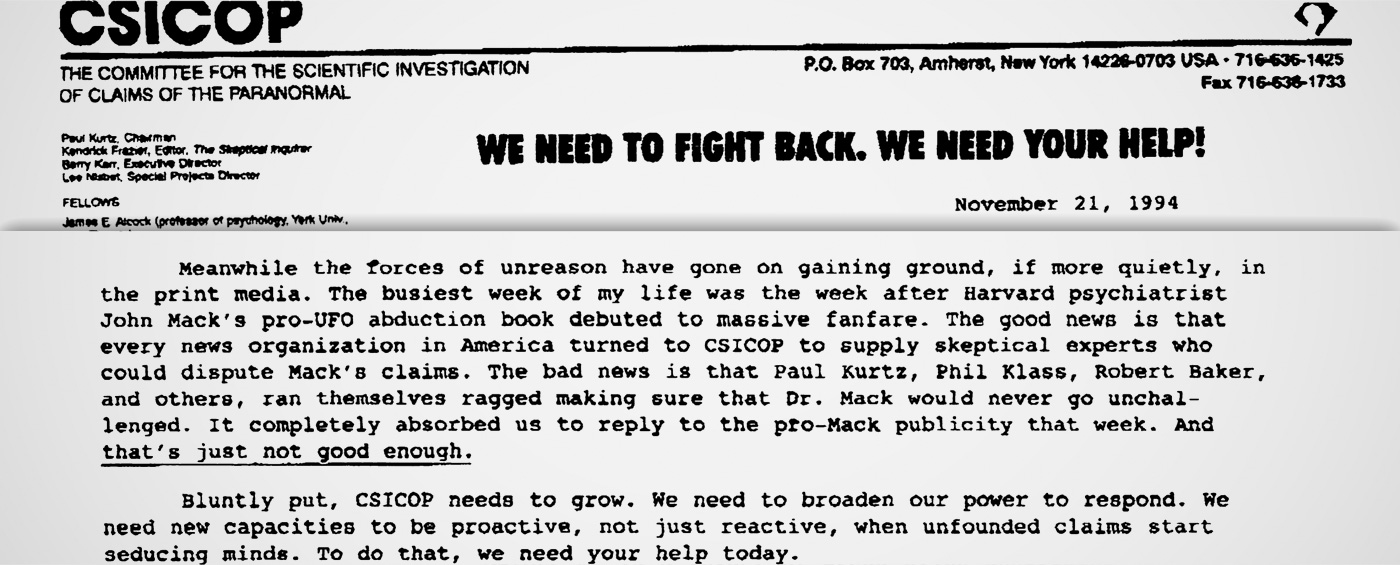
Much of the opposition has been orchestrated by the ironically-named Center for Inquiry, which directs 11 million dollars annually into two related efforts: CSICOP (since renamed CSI), dedicated to maintaining a scientific orthodoxy; and the Council for Secular Humanism, which endeavors to prevent acceptance of ideas that may lend indirect support to theological constructs. For reasons that are not entirely clear, part of that group’s mission is to dissuade people from seriously considering that alien encounters may be, more or less, what they seem to be.
Even absent the organized opposition, the extraordinary nature of the experiences should prompt a questioning attitude from any reasonable observer, and it is to this population that our efforts have been directed.
It has become clear that, in order to foster the collaboration that is needed on this complex subject, such explorations must be accompanied by consistent cultivation of an environment of conscious listening.
Advancing this goal has been possible thanks to the the financial and moral support of thousands of members of the public, including philanthropist and visionary Laurence Rockefeller.
PEER Forms a Bridge
It is difficult in our culture to credit and trust extraordinary experiences. A person attempting to speak about an experience for which we have no language cannot help but feel isolated. In turn, the listener attempting to comprehend what is being communicated may find it easier to dismiss the experience and the experiencer as irrational. PEER forms a bridge between speakers and listeners, between subjectivity and science. Working in the tension between direct human experience and larger scientific and philosophical questions, PEER does not seek to prove or disprove the existence of “aliens,” but to develop a framework for communication about such controversial topics.
The PEER community collaborates with individuals reporting anomalous experiences as well as with researchers, educators, therapists, and members of the interested public in order to expand the language of human experience to include extraordinary experiences, so that we might come to a deeper understanding of our identity and the larger world.
Case Statement for PEER
John E. Mack, M.D.
January 19, 1999
We all know more than we allow ourselves to know because of a certain cowardice in face of the inexpressible, and fear of accepting its effect on us as guide to the nature of its reality.
–Laurens van der Post, 1975, p. 2
In a letter to me, sent before we began our work together, Karin wrote, “Such a profound and beautiful world we live in, and how much more wondrous to truly know that not only are we not alone, we’re really not alone” (August 14, 1996). From her experiences Karin knows that she is not alone, but the words of this young person, who has done so much to express to others the power and meaning of her abduction experiences, also point to the central agony of our era, the absence of the experience of connection with any principle in the cosmos beyond ourselves, the loss of a sense of the sacred and the divine.
The assumption of aloneness and separateness has had tragic consequences for humankind and for many of the planet’s other living forms. In the place of a connection with a numinous intelligence, we have sought to quiet our spiritual longings with superficial satisfactions of power and domination and by ever more consumption of material goods at a pace that is destroying the earth’s capacity to sustain life.
The purpose of PEER’s work, in collaboration with others, is to examine and challenge the prevailing western worldview that assumes this isolation and underlies the destruction, what philosopher Michael Zimmerman calls anthropocentric humanism. We have been doing this by exploring and teaching others about the experiences of a courageous group of people, who have come forth to share with us the extraordinary encounters that they have had with beings or entities that appear to come from somewhere else in the cosmos, from another, unknown, realm.
These experiences can be traumatic or transcendent, depending upon how they are addressed. The abduction encounters seem to be unique in the dramatic speed of their potentially transformative power. Well-known writer and abduction experiencer Whitley Strieber said that when his Gurdjieff teacher [asked] about his experiencers with the beings which had, initially, been intensely terrifying, the teacher said, “Fifteen seconds with those people; fifteen years of meditation. You’re very lucky.”
The encounters are filled with images and information about the state of the earth’s environment and our responsibility for it. They also have the capacity to open consciousness and to bring the experiencers into direct connection with what they variously call the Source, Home, the One or God. As a result of this process a powerful commitment to the planet and its fate develops among the experiencers, those who work with them and whoever takes in the power of what they have to report.
At PEER we have studied not only the content, meaning and power of the so-called abduction experiences in our and in other cultures. In addition, we have been seeking to discover the appropriate methods of investigating a phenomenon such as this, which manifests in the physical world as we know it, but appears to derive from another, unseen, realm.
It is important to us at PEER to note that the western, scientific culture that has developed over the past several hundred years is perhaps unique in its focus on empirical/rational ways of knowing. This epistemology, which has brought us many of the great discoveries of science, has developed at the expense of the direct, experiential knowing by which other peoples throughout human history, and in most places on the planet to this day, have derived their understanding of the natural and unseen worlds. One of the great tasks for research in the future will be to find ways of integrating the methods of traditional science and the use of consciousness that has grown out of our work with experiencers to explore realities that do not yield their secrets to one method or approach alone.
We are also interested at PEER in understanding the resistance to accepting the very existence of other beings or intelligences beyond what can be discovered using the five senses and the instruments that may augment their range. Again, it is the restriction of perception that has accompanied the achievements of science, the inability to trust the knowledge of experience, that appears to be at the root of our reluctance to accept the testimony of abduction experiencers. Furthermore, the odd form taken by the alien beings, and the seeming mockery that their apparently superior technology makes of our technological achievements, provides a potentially devastating blow to our sense of ourselves as the preeminent intelligence in the universe.
PEER’s future work will focus on:
1) Further development of ways of exploring realities, or other dimensions of existence, that may not be fully revealed by the methods of traditional science.
2) Documenting with these methods, derived largely from the intersubjective ways of knowing of clinical, psychospiritual and shamanic traditions, the phenomena and entities that populate the cosmos.
3) To explore the nature of these other intelligences, and learn what they have to say to us.
4) Identify, and begin to explore in collaboration with others, additional phenomena, such as out of body and near death experiences, that also point to domains of reality that cannot be understood through the use of traditional methods of knowing.
5) Work collaboratively with other researchers from a variety of relevant disciplines to discover and refine methodologies that are appropriate for the study of phenomena like alien abductions, that seem to bridge the seen and the unseen worlds.
© 1999 John E. Mack, M.D.
Statement prepared Jan 19, 1999 for use by the PEER staff, “to be translated into funding requirements for specific research and public education projects and other organizational needs”.
|
PEER’s Accomplishments
During its years of active service, accomplishments of the program included:
Multidisciplinary Study Group on Anomalous Experiences
A panel of experts from a wide variety of fields were convened at Harvard to explore anomalous experiences in a multidisciplinary manner.
| From Dr. Mack’s summary of the event:
Held at the Harvard Divinity School, April 10 and 11, 1999, the group was composed of twenty-three academicians and clinicians inside and outside of Harvard. In addition to several psychiatrists and psychologists the group included historians of science and psychology, a neurophysiologist, an astrophysicist, an optical physicist, an anthropologist, an ethologist, a philosopher, a theologian and a psychiatric resident with degrees in medicine and religious studies. In addition, six experiencers attended portions of the meeting.
The following basic themes were considered in the group’s discussions:
- Ontology and worldviews and how these might affect perception, understanding and study of the abduction phenomenon and other anomalies of human expedrience;
- Why the alien abduction phenomenon stirs such strong reactions and is resisted so strongly;
- How do we study such matters? Toward a science of human experience;
- The margins of science and spirituality: scientific and religious ways of knowing;
- Implications for psychology, psychotherapy and the mental health field;
- General recommendations, future directions and specific studies.
|
The meeting, funded by the Fetzer Institute, grew out of a recommendation made by a special committee of the Harvard Medical School which urged Dr. Mack (in a 1995 report) to involve more colleagues in this work. Dr. Joseph Coyle, Chairman (Head of the Consolidated Department of Psychiatry), suggested that one way to do this would be to form a multidisciplinary working group to study the matter. Although Dr. Mack had already done so in 1992, having co-chaired the Abduction Study Conference at MIT, this group was different in that it included academicians who were relatively unfamiliar with the alien abduction phenomenon, its phenomenology, and the short and long term impact of these experiences on the abductees or experiencers.
| From the conclusion of Dr. Mack’s summary of the event:
Although understandably the meeting ended with more questions to consider than were noted at the beginning, several valuable ideas seemed to emerge from the discussion that might provide starting points for future meetings. Most noteworthy from this participant’s perspective were the following:
- The multidisciplinary approach appears to be of particular value in trying to understand the alien abduction phenomenon and related anomalies, as these do not fall into the province of any single discipline.
- The alien abduction phenomenon is particularly challenging to our dominant scientific worldview, as it seems to manifest, however elusively, in the physical world but not to be entirely contained by it.
- Worldviews enable individuals and a society to orient themselves in the universe, and thus provide an essential structure that organizes or holds together the psyche itself, individually and collectively. It is for this reason that a phenomenon like the alien abduction phenomenon may be resisted so intensely.
- New methods of study appropriate to an anomaly of this nature need to be developed. In particular this will require ways of establishing the authenticity of reported experiences, however much they may challenge our worldviews. Greater attention needs to be paid to language in examining reports of anomalous experiences, realizing that any description in words will be little more than a bare approximation of the actual experience.
- In the absence of physical evidence short of proof, and the virtual impossibility of experimental replication, there is a need to develop a “science of human experience,” which would include further development of phenomenological detail, rigorous ways of evaluating the individual reports, looking for evidence of consistency of reports, and developing greater clarity and refinement in our ways of determining whether an individual is being truthful in reporting his or her experiences.
- The traditional measurements of psychology, or the emphasis on psychopathology, are not particularly useful in understanding a phenomenon like this. There is a great need to develop a psychology of transformation, transcendence or self-realization to supplant the current focus on categorization, normality and psychopathology. Clinical approaches that rely more on intuitive, body-based or holistic ways of knowing need to be further developed, as well as methods of assessing reports of special healing powers, psychic ability or the tendency experiencers seem to have of disturbing the function of electronic devices in their vicinity.
- Although it may still be important to ascertain the degree to which abduction accounts or the reports of other anomalies are occurring literally, i.e. in the physical world as we know it, there should be more attention to discovering the transformative power or meaning of experiences like these for the experiencers, our society and our understanding of the universe.
- Studies which link autobiographical information provided by experiencers with physiological markers or “signatures,” such as the Moura and Don EEG study (Don and Moura 1997), might be especially valuable in distinguishing the abductees from other traumatized populations or anomalous experiencers.
- The abduction experiencers may represent an underutilized source of information about the cosmos, and possibly about the human future. The powerful messages that abductees bring us about the condition of the planet and our responsibility for it might be more carefully heeded (although this would involve a greater crediting of the source, i.e. the legitimization of the experiencers as valuable witnesses, a problem that was not discussed in much detail during the meeting).
- The abduction phenomenon does indeed skirt the margins of the worlds of science and spirit, or scientific and religious ways of knowing.
|
Multiple Witness Study
Pairs and groups of individuals reporting shared “alien encounter” experiences were studied in an effort to discern the external and subjective dimensions of the phenomenon;
| From the 2001 Phase IV report of the Multiple Witness Study: Summary and Conclusions
The original purpose of this multiple witness study was to see if the objective reality of the so-called alien abduction or encounter phenomenon could be corroborated. It is fair to say that the interpretation of our results led us to a mixed response to this question. On the one hand there is information from the secondary witnesses that confirms that some sort of event occurred. Each of the witnesses experienced a bright light at the beginning of the encounter, including [redacted]… What our data did not provide were parallel abduction experiences with the sort of cross-correlating details that John Carpenter has found (1996). Whether this is due to our selection of cases, or the way we collected our data, is not clear. This does not mean that cases of simultaneous cross-validating abductions do not exist; simply that ours were not of this nature. The pattern in our cases was of a different sort. With the possible exception of [redacted], there seemed to be a clear primary witness. The companion, or secondary witness [only recalls a light]. What this points to, and which might be worth further systematic study, are the dynamics of memory in relation to the abduction phenomenon… |
Psychometric Study of ‘Alien Abductees’ and a Matched Control Group
With Human Subject Committee approval from The Cambridge Hospital, the staff of PEER designed and implemented a study of individuals describing alien encounter experiences. The formal title of the study was, Personality Differences Related to Reports of Anomalous Experiences Commonly Called ‘Alien Abduction’.
The study failed to reveal any distinguishing personality traits in the experiencer group that might offer a prosaic explanation for the phenomenon, though two characteristics related to altered states were noted as being higher than average, which raised tantalizing questions:
| From the results of PEER’s personality study, 2002 draft:[1]
“Dissociation and absorption are two personality characteristics related to entering altered states.
Dissociation is an ability to split off certain mental processes from the main body of consciousness with various degrees of autonomy. Absorption is a personality style which denotes the degree to which an individual’s attention can remain absorbed cognitively in sensory stimuli or daydreams.
Thus, dissociation seems to mark an ability to enter altered states, while absorption seems to relate to an ability to maintain consciousness in that altered state. We think that experiencers may show moderate dissociative capacities (lower than pathological norms) and high absorption.” |
Similar results were obtained several years later by Prof. Chris French at Goldsmith in the UK (published in 2005).[2] That French is a skeptic of alien encounters provided confirmation that PEER’s results were unbiased. Though the findings were similar, PEER did not use these findings to suggests that alien encounters are illusory; rather, it added to the experiential evidence that PEER has collected which suggests that alien contact may occur in a world that is partially removed from the perception of everyday consciousness — a reality which may be undetectable to most people at most times.
Prior to PEER’s confirmation of these personality characteristics, Dr. John Mack had, through his own clinical expertise, recognized these traits in the people he was interviewing, and he offered this statement regarding the association between alien encounters and visionary states of consciousness at a talk at Oberlin College in 2001:
I think that the mind that has visions is very close to the mind that can have these experiences. [Even though] conventional psychological studies don’t distinguish abduction experiencers from other folks, there are differences. And one of them is this kind of openness to visionary experience. Either because people were already that way, or because the experiences opened them to a visionary kind of consciousness. A lot of times the experiences seem to begin in hypnagogic states, but that doesn’t mean they are dream states, that would be a mistake [to assume that].
— Dr John Mack at Oberlin College, 2001
[1] The results of PEER’s personality study were never published. A paper was completed in October 1999 and it was submitted to the Journal of Abnormal Psychology under the title “Anomalous Experience and Psychopathology: The Question of Alien Abduction”. The Journal’s Associate Editor, Dr. David Watson, stated in December that the three reviewers, “all felt – and I agree – that your paper addresses an important and timely issue. This is an area in need of sophisticated research, and we all would encourage you to continue working on it… Your results are interesting.” Dr. Watson, however, was disinclined to publish a paper of that length, and the reviewers’ recommendations for shortening it included changes to the premises that PEER did not agree with. The 1999 version and a revised version prepared in 2002 (retitled “Psychometric Study of ‘Alien Abductees’ and a Matched Control Group”) are in PEER’s archives.
[2] French’s paper (with similar results) is “
Psychological and Parapsychological Aspects of the Alien Contact Experience” by Christopher C. French, Julia Santomauro, Victoria Hamilton, Rachel Fox, & Michael Thalbourne, presented to the Conference on Developing Perspectives on Anomalous Experience, Liverpool Hope University College, 4 June 2005. Also presented at Bial Foundation’s 6th Symposium, Porto, Portugal, 29 March to 1 April 2006.
Publication of PEER Perspectives
PEER Perspectives, a newsletter (predating the ubiquity of the internet), distributed to nearly 10,000 interested scientists, researchers, experiencers, academics, clinicians, medical professionals, business people and the public in the U.S. and 44 other countries. (5,000 printed of #1, 7,000 of #2, 10,000 of #3.)
Read an issue of PEER Perspectives:
Extraordinary Experience Survey
In order to explore the range of extraordinary experiences and the characteristics of individuals who report them, in 1995 PEER sent out approximately 400 surveys to individuals who agreed to participate in research on the subject. We asked them about their life, their work, and their memories of extraordinary experiences including alien encounters, unusual dreams, and psychic phenomena. Read the results from the first 200 surveys:
Therapist Referral Directory and Consultation Network
At it’s peak, more than 100 licensed clinicians participated in this network designed to assist individuals seeking counseling related to anomalous experiences. Along with referrals, individuals were mailed An Experiencers Guide to Therapy. (We now simply encourage people to seek out open-minded therapists in their own communities.)
Public Education
Lectures and media appearances in the U.S. and abroad, and a range of essays and papers.
Media Assistance
We provide accurate information about the human dimension of alien encounters to members of the media; our statements have appeared in newspapers across the country, from the New York Times on down. With PEER’s assistance, articles that defended experiencers, such as the following, were made possible – hopefully to good effect. PEER endeavors to be a resource that can be trusted to provide a reasonable and sensitive assessment of the extraordinary experiences known as “alien encounters”.
Support Group
PEER did not have a support group; this item is provided for background.
Prior to the creation of PEER, a support group met once a month (except in August) from October 1990 to June 1993 at Dr Mack’s home. It fulfilled the usual functions of a support group, to serve as a “safe space” where people could confidentially share their experiences and discuss coping strategies. People were not invited to attend the group until after they had explored and come to terms with the experiences on their own. The group also received a visit from screenwriter Tracey Tormé and actress Daphne Ashbrook during the development of the television miniseries, Intruders. Building on the support group concept, in mid-1992 some members formed a 501c3 nonprofit, Group for Research and Aid to Abductees (GRAA), with the intention of creating systems by which experiencers who were having a difficult time could get direct help from other experiencers. GRAA dissolved in mid-1993 before those plans came to pass, but when PEER started later that year, a therapist referral system was created; see “Therapist Referral Directory and Consultation Network”, above.
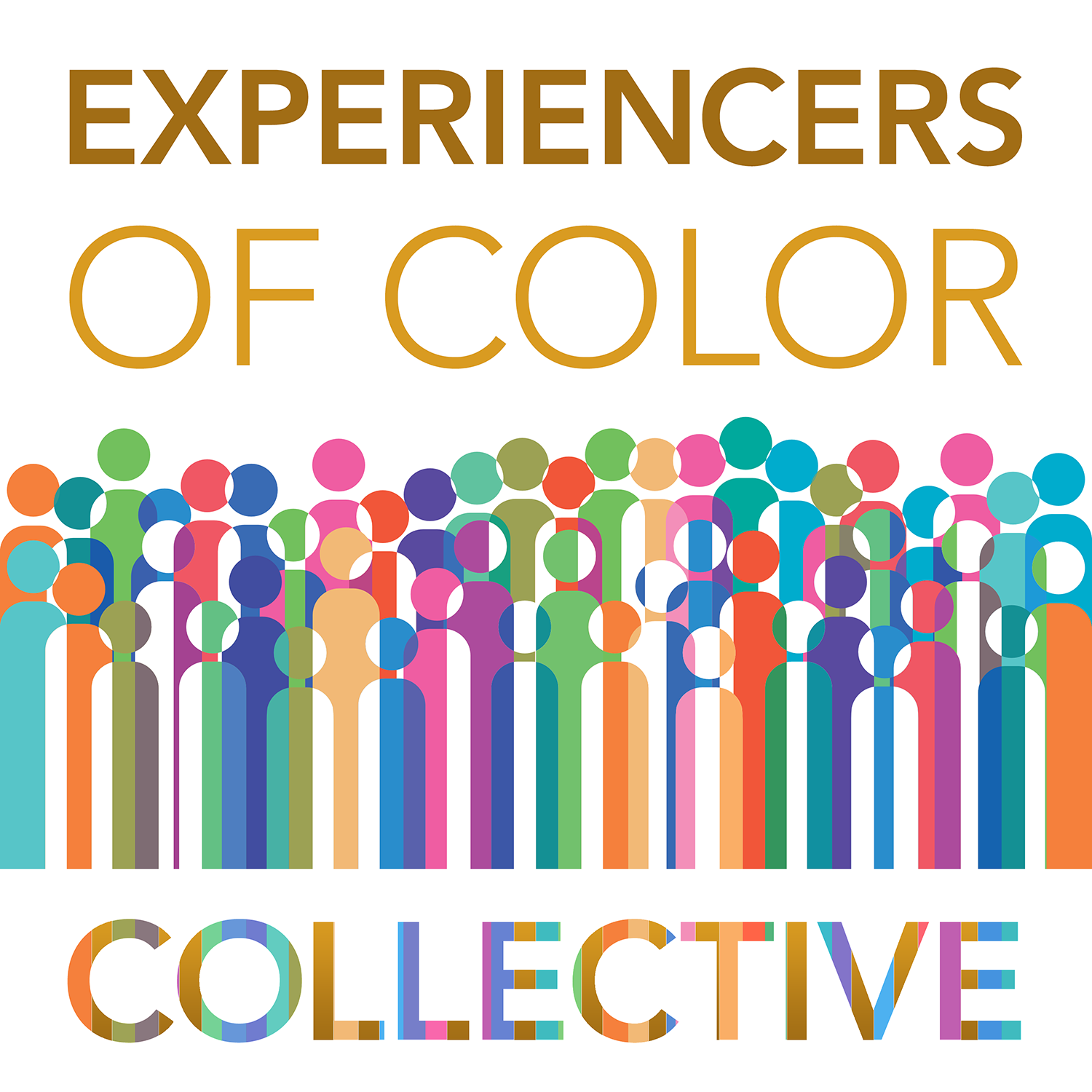


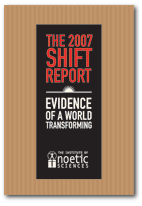 JEMI is co-sponsoring Dr Diane Powell’s efforts to produce IONS annual Transformation of Consciousness report, The Shift Report 2007: Evidence of a World Transforming. The report, available now (April 2007), is an 80 page overview of cutting-edge research, with Dr Powell’s examination of what the implications and applications of this research are for people personally and collectively.
JEMI is co-sponsoring Dr Diane Powell’s efforts to produce IONS annual Transformation of Consciousness report, The Shift Report 2007: Evidence of a World Transforming. The report, available now (April 2007), is an 80 page overview of cutting-edge research, with Dr Powell’s examination of what the implications and applications of this research are for people personally and collectively.
